Farmer protests continue in Berlin over fuel subsidy cuts
DPA
Tue, January 16, 2024
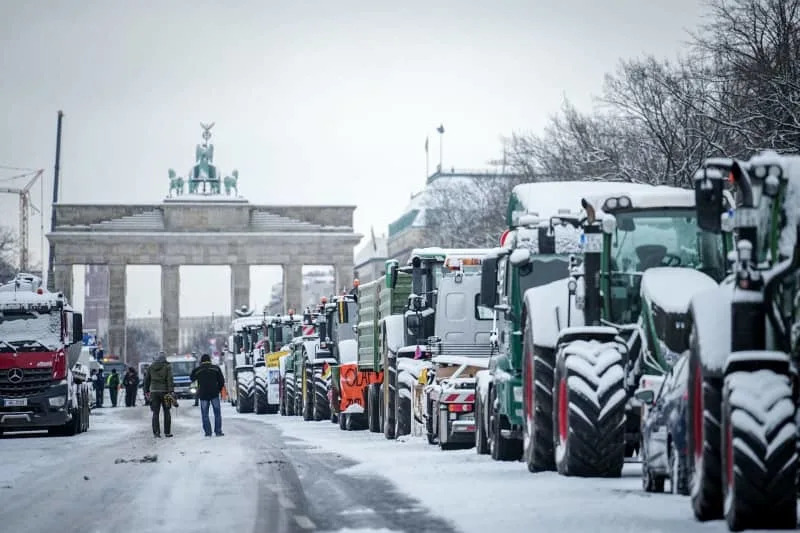
Numerous snow-covered tractors stand on the street 17 in front of the Brandenburg Gate. Farmers, haulage companies and tradespeople protest against planned cuts in subsidies by the German government, including for agricultural diesel. Kay Nietfeld/dpa
Protesting farmers continued to drive tractors around Berlin's government district on Tuesday, a day after mass demonstrations against proposals to cut agricultural diesel fuel subsidies.
About 330 tractors and other farm vehicles stood along the boulevard leading toward Berlin's iconic Brandenburg Gate on Tuesday morning, according to local police.
But police said there was a constant stream of departures and new arrivals.
Two further demonstrations were announced on Tuesday, including one by a farmers' association for the surrounding German state of Brandenburg. Further convoys of tractors joined them in the course of the morning.
In addition, a vigil by the Free Farmers' Association had been running since the previous night.
On Monday morning, several thousand tractors, and many more protesters, descended on central Berlin to demonstrate against the fuel subsidy cuts proposed by Chancellor Olaf Scholz's coalition government.
The proposal came amid efforts by Scholz's government to close a major budget gap. The government has so far softened the proposal, offering to gradually phase out the subsidy over three year, but agricultural leaders have demanded further concessions.
The centre-right CDU/CSU opposition bloc, which has largely backed the farmers in their protest against the government, called on Tuesday for wide-ranging financial and regulatory relief for the agricultural sector.
The CDU/CSU has proposed making the diesel fuel subsidy permanent, extending permits for livestock barns and creating a new animal welfare fee on products in supermarkets to offset the cost of implementing new welfare and environmental regulations.
"There finally needs to be an awareness that every regulation, every rule and every requirement is associated with harsh consequences for the daily work of our farmers,"
the CDU's Steffen Bilger told dpa.
There's no more money, German minister tells rowdy farmers
Mon, January 15, 2024
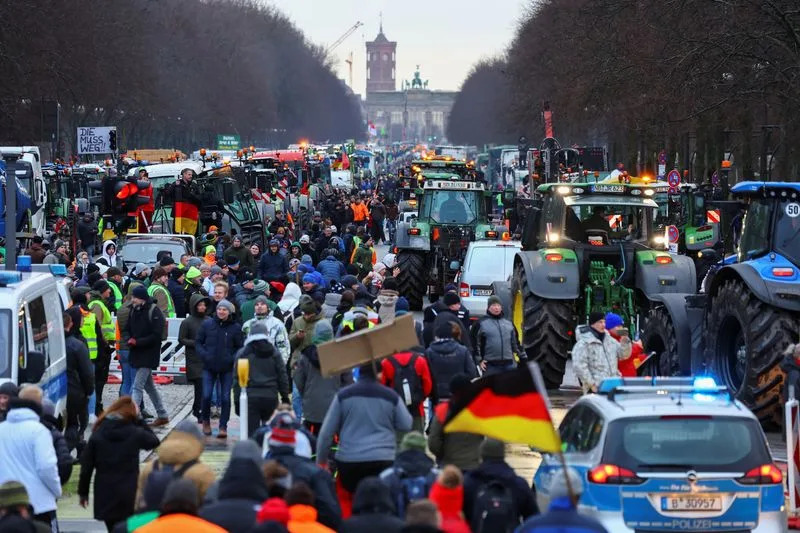
By Thomas Escritt
BERLIN (Reuters) - Germany's Finance Minister Christian Lindner took to the stage on Monday in front of thousands of jeering farmers protesting against tax rises and told them there was no money for further subsidies.
Berlin has been brought to a near standstill by the demonstration, which filled one of its central avenues with trucks and tractors as some 10,000 farmers arrived to cap a week of protests that have become a flashpoint for anti-government anger.
"I can't promise you more state aid from the federal budget," Lindner told the crowd from a chilly stage in front of the Brandenburg Gate. "But we can fight together for you to enjoy more freedom and respect for your work."
The protests have heaped pressure on Chancellor Olaf Scholz's coalition as it struggles to fix a budget mess and contain right-wing groups.
The protests erupted after a government decision to phase out a tax break on agricultural diesel as it tried to balance its 2024 budget following a constitutional court ruling in November forced it to revise its spending plans.
Facing a backlash, the government has already said it would maintain a tax rebate on new agricultural vehicles and spread the scrapping of the agricultural diesel subsidy over several years.
But farmers, with the vocal backing of the opposition conservatives and the far-right, say that is not enough.
"I have respect for every politician who is prepared to come to us," said Farmers' Union head Joachim Rukwied, who at one moment had to take the microphone from Lindner and beg the crowd to stop jeering for long enough to listen to him.
"The finance minister is here," he said. "It makes no sense to boo him."
The government has taken a conciliatory tone as concern has grown that political debate has become radicalised and demonstrations could turn violent.
Disruption caused by protests and train strikes last week hurt coalition parties in the polls and propelled the far-right Alternative for Germany party to new heights.
At a later meeting with protest leaders in parliament, coalition legislators promised, without giving details, to unveil proposals on Thursday that would lower costs to farmers while making their sector "sustainable".
MUCKING OUT
Lindner, describing himself as a lad from the countryside who had mucked out stables in his time, sought to win over farmers by contrasting their peaceful protest in Berlin to the behaviour of climate activists who had sprayed paint on the Brandenburg Gate - "the symbol of German national unity".
But he said scarce money was needed for long neglected investments in schools and roads and for industrial energy subsidies.
Jeers grew louder when Lindner said money was needed because of the war in Ukraine.
"With the war in Ukraine, peace and freedom in Europe are threatened once again, so we have to invest once again in our security as we used to," he said.
Complaints ranging from high energy costs to competition from Ukrainian grain have driven farm protests around Europe in recent months. On Monday, Romanian farmers protested near border crossings with Ukraine, a vital lifeline for Kyiv's war effort, to drive home their demand for more public support.
Tractors and trucks that arrived overnight from across Germany parked nose-to-tail along the route. Crowds of farmers, wrapped up against the cold, waved German flags and held up banners marked with slogans including: "Without farmers, no future".
The governing parties are divided over how best to meet farmers' demands. Agriculture Minister Cem Ozdemir, a Green, has suggested financial rewards for humane animal husbandry, while some Social Democrats want to offer higher produce prices, and Lindner's Free Democrats want to cut administrative overheads.
Several bus and tram lines closed for the protest, which was patrolled by around 1,300 officers, police said.
(Reporting by Thomas Escritt, Linda Pasquini, additional reporting for Sibylle de la Hamaide in Paris; Reuters TV; Editing by Andrew Heavens, Barbara Lewis and Ros Russell)
German farmers and their tractors throng Berlin in a protest against fuel subsidy cuts
GEIR MOULSON
Mon, January 15, 2024
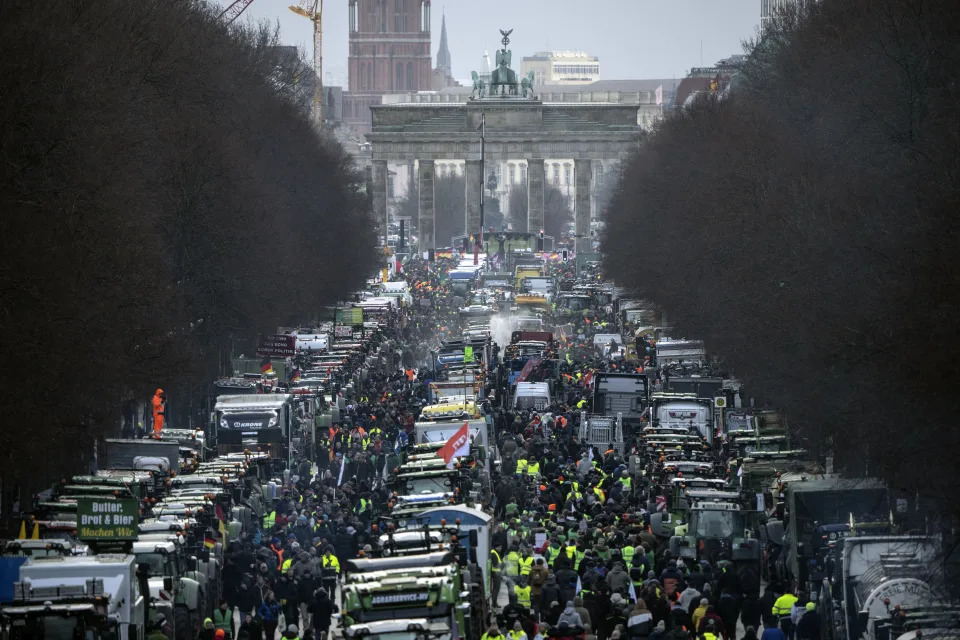
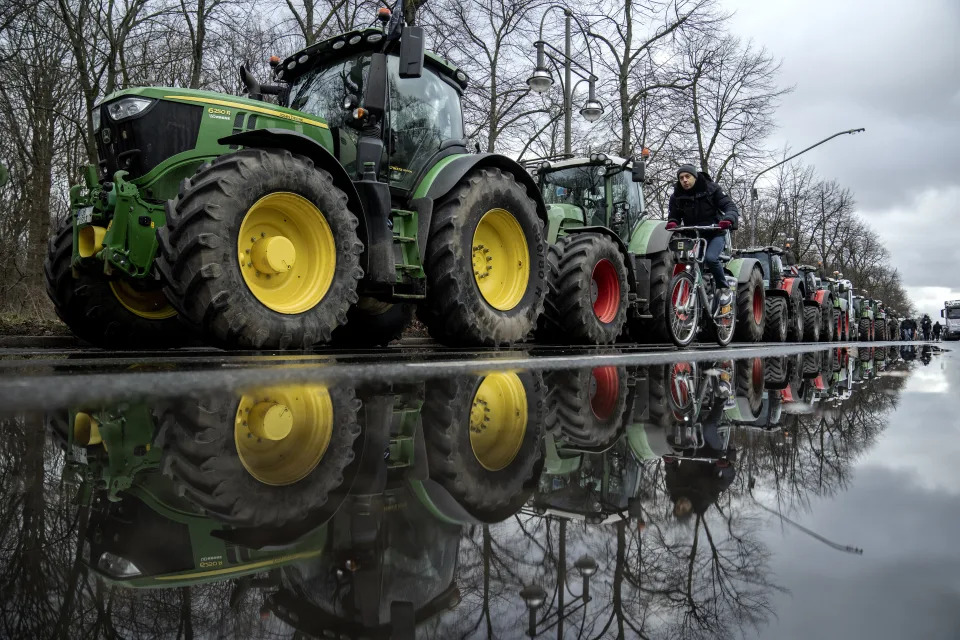
1 / 13
APTOPIX Germany Farmers Protest
Farmers with tractors arrive for a protest at the Brandenburg Gate in Berlin, Germany, Monday, Jan. 15, 2024. Farmers drove thousands of tractors into Berlin on Monday in the climax of a week of demonstrations against a plan to scrap tax breaks on the diesel they use, a protest that has tapped into wider discontent with Germany’s government. (AP Photo/Ebrahim Noroozi)
BERLIN (AP) — Farmers clogged Berlin streets with their tractors on Monday, honking their horns in protest at a plan to scrap tax breaks on the diesel they use, the climax of a week of protests that has tapped into wider discontent with Germany’s government.
Columns of tractors rolled into the capital ahead of the demonstration at the landmark Brandenburg Gate. Over the past week, farmers have blocked highway entrances and slowed traffic across Germany with their protests, intent on pushing Chancellor Olaf Scholz’s government to abandon the planned cuts entirely.
They’re not satisfied with concessions the government has already made. On Jan. 4, it watered down its original plan, saying that a car tax exemption for farming vehicles would be retained and the cuts in the diesel tax breaks would be staggered over three years.
“Take back the proposed tax increases, then we'll pull back,” said the chairman of the German Farmers’ Association, Joachim Rukwied. He said the demonstration sent a message to politicians that “too much is too much.”
“We are an important part of Germany — please don't forget that,” he said.
Finance Minister Christian Lindner was greeted with boos, whistles and chants of “Get lost” as he defended the government's revised plan. He conceded that the original proposal “was too much and it was too fast” and said the protests were legitimate and peaceful.
“There should be no special sacrifice by farming, just a fair contribution” to getting Germany's finances in order, he added. He told Rukwied that “your protest was already successful” and said the delay in cutting the tax breaks buys time to find ways to reduce bureaucracy for farmers and improve their productivity.
The plan to reduce the tax breaks resulted from the need to fill a large hole in the 2024 budget. The farmers’ protests come at a time of deep general discontent with Scholz's center-left government, which has become notorious for frequent public squabbles and lengthy wrangling over sometimes poorly communicated decisions.
In a video message Saturday, Scholz acknowledged concerns that go well beyond farming subsidies, saying that crises, conflicts and worries about the future are unsettling people. Polls have shown a comfortable majority sympathizing with the farmers’ protest, and Monday’s demonstration was joined by Germany’s road transport association.
Farmers say their frustration runs deeper than the current plans.
“We are not standing here today just because of the agricultural diesel cuts,” Theresa Schmidt, head of an association that represents young farmers, told the rally. “In recent years and decades, we have been beaten endlessly — more and more requirements, tighter rules and restrictions.”
“We have more and more requirements and are being overloaded with food from abroad that is produced below our standards," said Alfred Winkler, a farmer from the Bavarian region of Franconia.
Lindner said “agriculture isn't a sector like every other” and there are good reasons for state support, noting that it gets 9 billion euros (nearly $9.9 billion) from the government and the European Union every year.
Farmers' representatives met later Monday with the leaders of all three governing parties' parliamentary groups, who held out the prospect of action on the wider challenges farmers face. But they didn't resolve the disagreement over diesel tax breaks.
___
Kerstin Sopke in Berlin contributed to this report.
Farmers in Germany decry plans to scrap diesel tax breaks
Liv Stroud
Mon, January 15, 2024

Tens of thousands of farmers rolled into Berlin aboard tractors on Monday for the climax of a week of demonstrations against a plan to scrap tax breaks on the diesel they use, a protest that has tapped into wider discontent with Germany's government.
Police said late Sunday evening that the space set aside for vehicles in front of the Brandenburg Gate, where Monday's demonstration was being held, was already full.
Over the past week, farmers have blocked highway entrances and slowed down traffic across Germany with their protests, intent on pushing Chancellor Olaf Scholz's government to abandon the planned cuts entirely.
Brussels, my love? German farmers' freak-out panics Brussels
They're not satisfied with the concessions the government has already made. On 4 January it watered down its original plan, saying that a car tax exemption for farming vehicles would be retained and the cuts in the diesel tax breaks would be staggered over three years.
24-year-old farmer Philipp Oswald said farmers would rather not rely on subsidies but warned without them many would be forced to abandon the profession and Germany would be left with to rely on more imports.

Farmers with tractors arrive for a protest at the Brandenburg Gate in Berlin, Germany, Monday, 15 January 2024 - Ebrahim Noroozi/Copyright 2024 The AP. All rights reserved.
"It's not in anyone's interest to excessively import goods from abroad that haven't been produced to the standards we've been following for 30 or 40 years," he told Euronews.
Scholz said in a video message on Saturday that “we took the farmers’ arguments to heart” and insisted the government came up with “a good compromise.” He also said officials will discuss “what else we can do so that agriculture has a good future.”
Leaders of the three governing parties' parliamentary groups plan to meet with farmers' representatives, though officials have dampened hopes of scrapping the subsidy cuts.
German farmers descend on Berlin with tractors in protest against plans to scrap diesel tax break
Martin Hofstetter, a political expert in agriculture at Greenpeace Germany said 50% of German farmer's income comes from agricultural subsidies.
He cautioned that "it's clear that these subsidies, as they are currently being paid, are senseless in the long run. Farmers also know this. We could go and say, let's see who needs this money. And also, how do we use the money in the future? It's clear that our agriculture needs to be more climate-friendly, climate-adapted, respond to climate change, and become more ecological."

A sign in German saying "We farmers take care of your food" hangs on a tractor parked along Bismarckstraße during the farmers' protest in Berlin, 15 January, 2024. - Monika Skolimowska/(c) Copyright 2024, dpa (www.dpa.de). Alle Rechte vorbehalten
Hofstetter, who studied agriculture, said he doesn't believe all or many farms will suddenly stop producing if the subsidies are reduced, but argued that a stronger focus on regional markets, on the European market would emerge.
"For the 420 million EU residents who want high-quality products – we should focus more on them and less on competing with China or Brazil in the world market," he explained.
The plan to cut the tax breaks resulted from the need to fill a large hole in the 2024 budget. The farmers’ protests come at a time of deep general discontent with the centre-left Scholz’s government, which has become notorious for frequent public squabbles and lengthy wrangling over sometimes poorly communicated decisions.
Scholz acknowledged concerns that go well beyond farming subsidies, saying that crises, conflicts and worries about the future are unsettling people.
Tractors head again to Berlin centre in climax to farmer protests
DPA
Mon, January 15, 2024
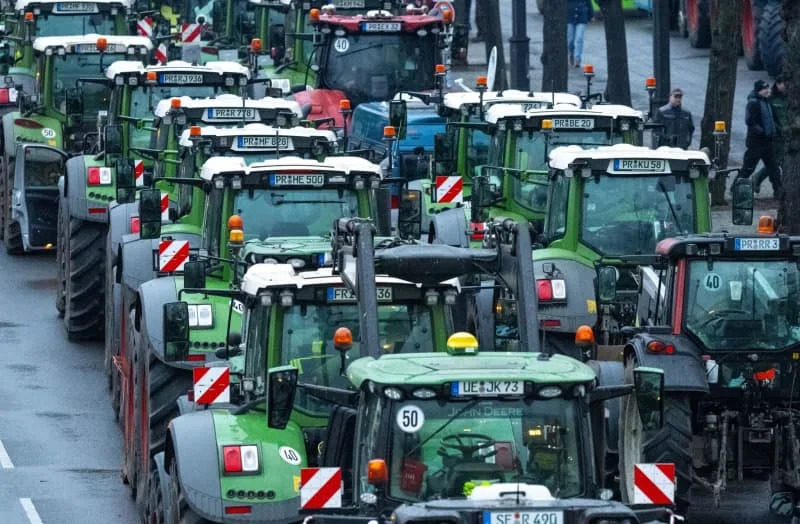
Numerous tractors parked at Strasse des 17. Juni between Tiergarten S-Bahn station and Ernst-Reuter-Platz. According to the police, around 10000 participants and 5000 vehicles are expected to take part in a large demonstration by farmers' associations and the BGL haulage association against planned subsidy cuts by the federal government, including for agricultural diesel. Monika Skolimowska/dpaMore
Large numbers of tractors were heading to Berlin city centre on Monday morning for another demonstration by farmers who are angry at government plans to end tax breaks on diesel fuel.
Honking tractors could be heard in several neighbourhoods. Other agricultural workers were also seen joining the protest.
Around midday (1100 GMT) thousands of farmers from all over Germany plan to hold a rally at the iconic Brandenburg Gate against the end of diesel tax breaks for the agricultural sector, in a climax to their week of protests. Many tractors were already parked by the monument in the early morning.
In addition to representatives of the Farmers' Association and trade unions, Germany's Finance Minister Christian Lindner will also speak at the rally.
Around 5,000 tractors and other agricultural vehicles from all over Germany are expected to take part.
On Sunday evening, the police were already having to stop tractors from entering the demonstration area in the capital's governmental district.
"It can't take any more," said a police spokesperson in the evening.
Heavy traffic obstructions are to be expected throughout the German capital on Monday.
In one concession, the government has decided not to abolish the motor vehicle tax exemption for the agricultural sector. However, farmers argue that this decision does not go far enough.

Farmers tractors line up in a parking lot to gather for their journey to Berlin. Thousands of farmers are expected to take part in another major demonstration in Berlin on Monday against the planned end of diesel tax breaks for the agricultural sector. Patrick Pleul/dpa
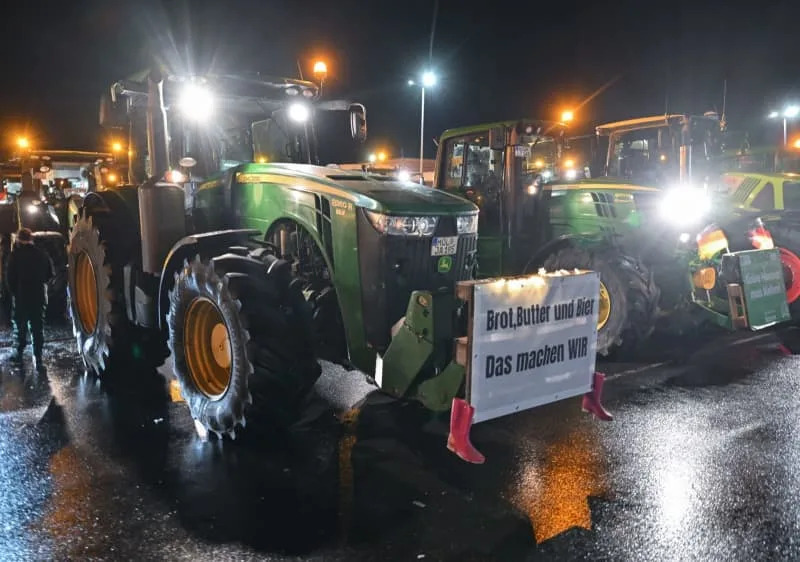
Farmers tractors line up in a parking lot to gather for their journey to Berlin. Thousands of farmers are expected to take part in another major demonstration in Berlin on Monday against the planned end of diesel tax breaks for the agricultural sector.
Patrick Pleul/dpa
Thousands of tractors block traffic in central Berlin
DPA
Mon, January 15, 2024 at 3:26 AM MST·2 min read
2
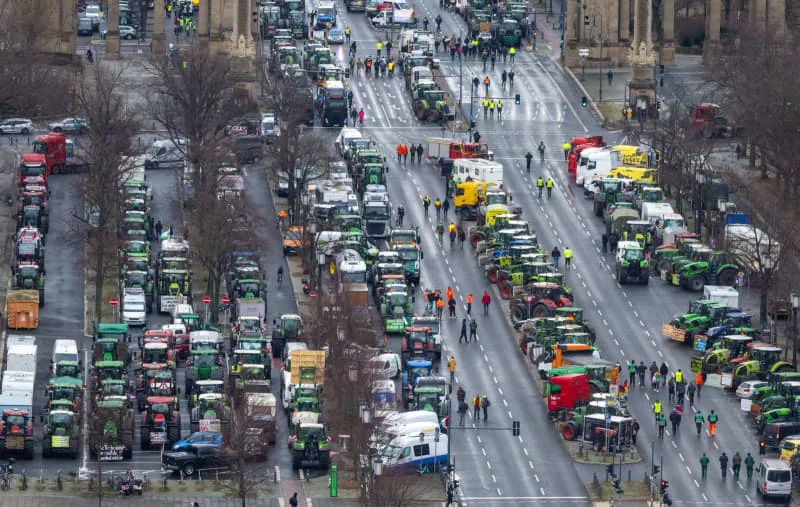
Numerous tractors, trucks and cars parked on the Strasse des 17. According to the police, around 10000 participants and 5000 vehicles are expected to take part in a large demonstration by farmers' associations and the BGL haulage association against planned subsidy cuts by the federal government, including for agricultural diesel. Monika Skolimowska/dpa
Thousands of German farmers, lorry drivers and craftsmen gathered with tractors and other heavy equipment in front of Berlin's iconic Brandenburg Gate on Monday morning.
Police on Monday morning estimated that at least 3,000 tractors had already arrived for the protest and an estimated 2,000 more were on the way. The tractors blocked traffic in parts of the city, and Berlin's public transit agency reported major service delays.
About 10,000 people had registered for the demonstrations, but Berlin police expect even more to attend.
A total of 1,300 police officers have been deployed to accompany the farmer protests, Police Commissioner Barbara Slowik told city leaders on Monday.
The farmers are protesting against government plans to cut diesel fuel subsidies for the agricultural sector.
Joachim Rukwied, the president of the German Farmers' Union, and German Finance Minister Christian Lindner of the liberal-conservative Free Democrats (FDP) party are among those due to speak at the demonstration.

Numerous tractors, trucks and cars lined up on Strasse des 17. Juni. According to the police, around 10000 participants and 5000 vehicles are expected to take part in a large demonstration by farmers' associations and the BGL haulage association against planned subsidy cuts by the federal government, including for agricultural diesel. Monika Skolimowska/dpaMore
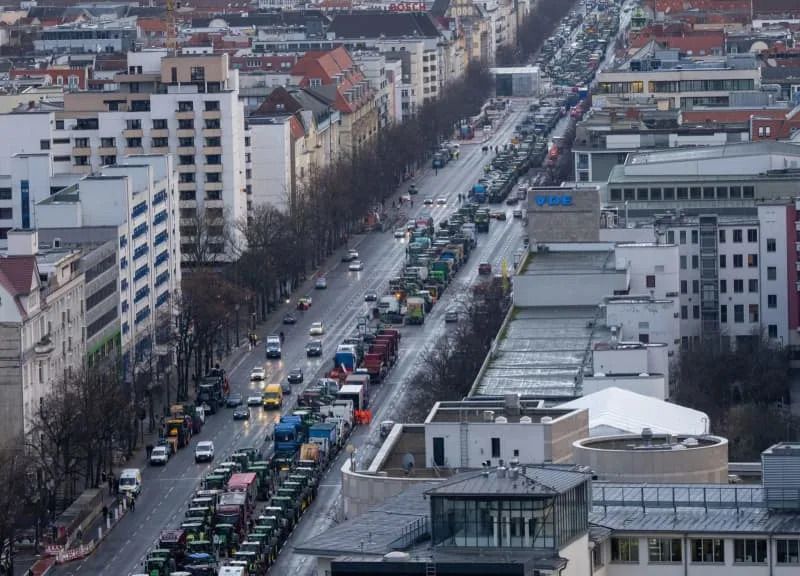
Numerous tractors, trucks and cars are parked on the central reservation and at the side of the road on Bismarckstrasse. According to the police, around 10000 participants and 5000 vehicles are expected to take part in a large demonstration by farmers' associations and the BGL haulage association against planned subsidy cuts by the federal government, including for agricultural diesel. Monika Skolimowska/dpaMore
Tractors converge on Berlin for farmers' protest
Reuters
Sun, January 14, 2024
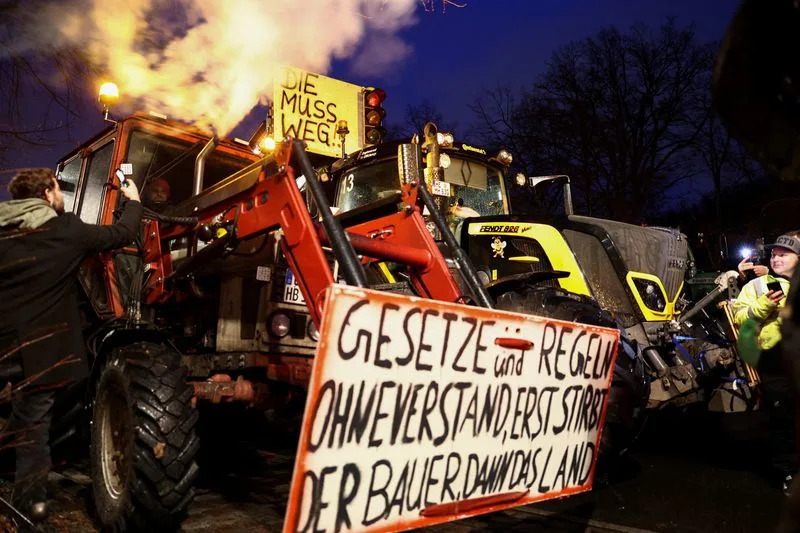
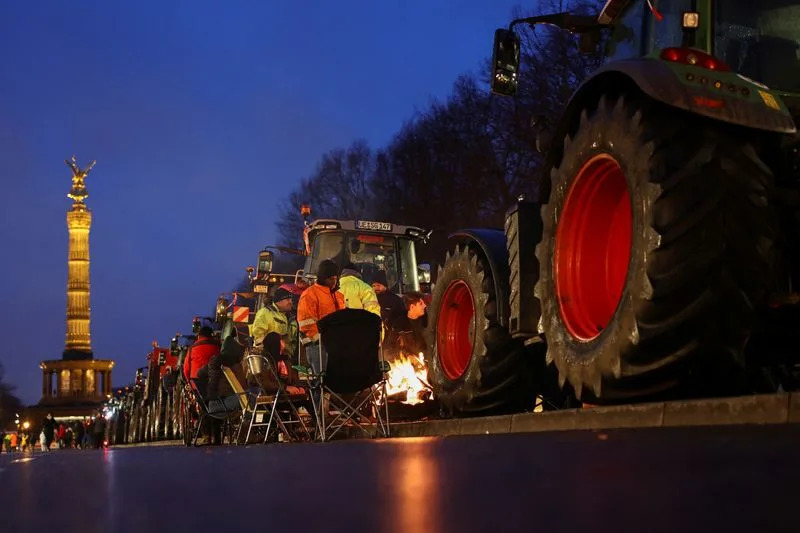



German farmers prepare for a protest against the cut of farm vehicle tax subsidies in Berlin
BERLIN (Reuters) - Farmers and their tractors rumbled towards Berlin from every corner of Germany on Sunday ahead of a giant protest demanding a rethink of plans to tax farmers more.
Some 3,000 tractors, 2,000 trucks and 10,000 people were expected to fill the streets around Berlin's Brandenburg Gate on Monday for a rally that will cap a week of protests against the government.
The protests have heaped pressure on Chancellor Olaf Scholz's coalition as it struggles to fix a budget mess and contain right-wing forces.
Caught on the back foot, it has already agreed not to scrap a tax rebate on new agricultural vehicles and to spread over years the scrapping of an agricultural diesel subsidy.
But farmers, with the vocal backing of the opposition conservatives and the far-right, say this does not go far enough.
"Farmers will die out," said farmer Karl-Wilhelm Kempner on Sunday as he boarded a bus in Cologne heading for the demonstration. "The population must understand that far more food will be imported" if subsidies are not restored.
The government is showing a conciliatory face amid concerns that political debate in the country is becoming radicalised and that demonstrations could turn violent.
Finance Minister Christian Lindner will address the protest and coalition party leaders have invited leaders of the demonstrations for talks.
Disruption caused by protests and train strikes last week hurt coalition parties in the polls and propelled the far-right Alternative for Germany party to new heights.
In a video podcast on Saturday, Scholz said the government had listened to farmers' demands and compromised.
"We've taken the farmers' arguments to heart and revised our proposals. A good compromise," he said.
(Reporting by Thomas Escritt; Editing by Ros Russell)
Reuters
Sun, January 14, 2024


German farmers prepare for a protest against the cut of farm vehicle tax subsidies in Berlin
BERLIN (Reuters) - Farmers and their tractors rumbled towards Berlin from every corner of Germany on Sunday ahead of a giant protest demanding a rethink of plans to tax farmers more.
Some 3,000 tractors, 2,000 trucks and 10,000 people were expected to fill the streets around Berlin's Brandenburg Gate on Monday for a rally that will cap a week of protests against the government.
The protests have heaped pressure on Chancellor Olaf Scholz's coalition as it struggles to fix a budget mess and contain right-wing forces.
Caught on the back foot, it has already agreed not to scrap a tax rebate on new agricultural vehicles and to spread over years the scrapping of an agricultural diesel subsidy.
But farmers, with the vocal backing of the opposition conservatives and the far-right, say this does not go far enough.
"Farmers will die out," said farmer Karl-Wilhelm Kempner on Sunday as he boarded a bus in Cologne heading for the demonstration. "The population must understand that far more food will be imported" if subsidies are not restored.
The government is showing a conciliatory face amid concerns that political debate in the country is becoming radicalised and that demonstrations could turn violent.
Finance Minister Christian Lindner will address the protest and coalition party leaders have invited leaders of the demonstrations for talks.
Disruption caused by protests and train strikes last week hurt coalition parties in the polls and propelled the far-right Alternative for Germany party to new heights.
In a video podcast on Saturday, Scholz said the government had listened to farmers' demands and compromised.
"We've taken the farmers' arguments to heart and revised our proposals. A good compromise," he said.
(Reporting by Thomas Escritt; Editing by Ros Russell)
No comments:
Post a Comment